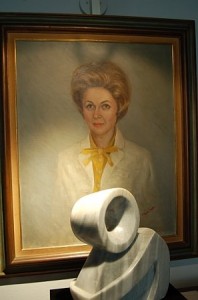The first truth about roller coaster rides is that it can be scary, exhilarating, fun and vomit-inducing, but, at its end, it delivers you to its starting point and you wobble out onto terra firma.
The second truth is that you don’t need to go to an amusement park to ride one.
Thursday began like any other day. I was late getting to the office for a call with opposing counsel. I didn’t even try to blame the trains. I emailed him on my subway ride to push back the call 15 minutes.
When I get out of the subway, I receive a text from Dad’s home health aide (HHA).
“Have your sister call me immediately.”
My sister, SOB (sister of blogger] is a doctor. This is not good. I call SOB immediately.
“SOB, it’s [Blogger], call HHA immediately. She just texted that she needs to speak with you. Call me after you speak to her.”
I am shaking. Is this the day? I don’t exactly remember the walk to my office. But as I start to turn on my computer, my ringing cell phone snaps me back.
“It’s [SOB], HHA had to call 911 because Dad is basically non-responsive.”
Is this the day that Dad dies?
SOB and I know that we have to run to Dad’s house before anyone takes him to a hospital, so we can evaluate the situation. He is almost 94 years old and has told us, again and again, that he wants to die in his bed. And, unless there was acute pain or discomfort to relieve, being in a hospital is only torture for a person his age. Old age is old age. This is not a curable condition. It is a fact of life.
I run part of the way there. SOB is still in traffic. I look at Dad. He is now alert and comfortable on the gurney. He knows me and seems relieved I am there. He has no pain but looks so tired. He smiles as he does when family walks into the room. Our embrace is awkward because he is on a gurney.
“Dad, [SOB] is coming any minute and we will figure out whether you need to go to the hospital.”
“Yes, darling. Let’s wait for [SOB].”
The EMTs tell me all his vitals are good. Apparently, Dad slumped over at breakfast and HHA couldn’t rouse him. She literally lifted him and had him lean on her while she got him to his bed in his bedroom. The EMTs said he was non-responsive when they got there but with a little rubbing on his sternum, he started to wake up.
Dad hovered between life and death and came back to life.
So, TODAY IS DEFINITELY NOT THE DAY. Still, the crisis isn’t over until the EMTs unstrap Dad from the gurney and they leave his house.
And Dad had mentioned heart disease, so the EMTs want to take him to the hospital.
“Dad is in mild heart failure. Who isn’t at almost 94? There is heart disease in his family, but he takes no medications, except an evening scotch.”
And then Dad says:
“They might not get paid if they came all this way and don’t come back with a patient.”
The EMTs smile. They understand that my father wants to do the honorable thing. They are also a little confused by his seeming clarity in one moment and his dementia in another. The EMTs wait for SOB to arrive (G-d bless professional courtesy).
Then Dad said:
“Before we go anywhere, I have to say goodbye to my wife.”
The EMTs look at me and look at HHA, who is 50 years his junior.
“NO, NO, NO,” I say. “Look at the wall. See the painting? That is Mom in 1967. He needs to say good-bye to HER.”
 OMG OMG OMG. This still could be the day. Oh, SHIT.
OMG OMG OMG. This still could be the day. Oh, SHIT.
The EMTs were fabulous. One was a little circumspect, probing about my knowledge of Dad’s medical and mental state. I appreciated his concern and we walked a little away from Dad.
“Look, my father has been exceptionally healthy his whole life. He is at the end of his life. If he is not in pain or gasping, why would I want newly minted doctors (it IS July, after all) poking and prodding him? But, let’s wait for the real doctor, my sister.”
Then that EMT starts to test my knowledge of Jewish culture and Yiddishkeit. The Blogger family name is stereotypically Jewish. And he was testing me to figure out if I understood the Commandment to honor my father and my mother.
SOB walks in and consults with the EMTs. Then she says to both of them:
“Last time he was in a hospital, it was for a brain bleed resulting from tripping on the sidewalk. Although he was in neuro ICU and was watched by a private nurse, he got out of bed twice and fell both times. Since then he wanders. A hospital is not a safe place for him. He has terrific 24 hour care at home. And my sister and I are each a cab ride away.”
Both EMTs understood. The circumspect EMT (who turned out to be an observant Jew) was more comfortable when we knew some Yiddish and when we told him that we had been through this drill before and we had tended to our mother in her dying days.
He said, “We have to call the supervisor. I fear Hashem [G-d], my wife, gobblins and my supervisor, and your dad said he wanted to go to the hospital before you both arrived.”
“I get that. Make yourselves to home. Can we give you something to drink or eat?”
The observant Jew demurred. The other EMT said, his wife packs food. So I asked, “you fear both your wife and Ha-Shem on this score.” He nodded.
The EMTs and Dad start to talk. They ask how he feels.
“It is the end.”
“End of what, sir?”
“The end of my life.”
Those words hang in the air, until interrupted by the arrival of the supervisor. The supervisor calls the doctor on duty. Everyone groans.
“What’s wrong with this doctor?” I ask, thinking the nightmare has just begun.
“He’s been sued a lot. He will want to enforce transport to the hospital.”
WAIT. WAIT. I have power of attorney. My sister has health proxy. We, and our 24/7 nursing care, take excellent care of Dad. We see him all of the time. We know his wishes, his medical history and, hell, what he eats in the diner and what he hates in a museum. We speak to him everyday and see him every weekend. Dad has told us what he wants and he trusts us. And we love him.
DIDN’T YOU SEE THAT HE WASN’T AFRAID ANYMORE WHEN HIS CHILDREN ARRIVED? THAT HE PERKED UP? HOW CAN THIS DOCTOR OVER THE PHONE ENFORCE THE TRANSPORT TO THE HOSPITAL?
Well, he did. SOB and I would not stand for it. Dad was sitting in a chair talking and feeling comfortable. He didn’t need to go to the hospital.
“Call the doctor back. NOW!”
At this point the EMTs are rooting for keeping Dad home. And I was ready to name Dr. [Blank] in a lawsuit. After the doctor spoke to Dad, he asked to speak to the daughter who is the lawyer. NOT THE DAUGHTER WHO IS THE DOCTOR. This is some paranoid dude.
“Yes, Dr. [Blank}.”
“Ms. [Blogger], BLAH BLAH BLAH. BLAH BLAH BLAH. BLAH BLAH BLAH” – I made the universal hari kari sign so everyone in the room could feel my pain — “Your father could have any number of issues.”
“Dr. [Blank], he is almost 94 years old. Can any of those potential issues be prevented by a hospital visit today? We can agree that the answer is no. And you have our family’s thanks for not compelling transport to a hospital. I appreciate your advice on guardianship. Thank you, doctor.”
The EMTs cheer the outcome. We hugged one EMT and I said to the observant Jew, “I won’t hug you or shake your hand, but I would if you weren’t observant.”
“Thank you. In this case, I fear my wife first. Hashem, second.”
SMART MAN, THAT EMT.
All non-essential personnel left. I went out to get pizza for everyone. To celebrate success after the two hours that felt like ten. We ate. We all sacked out for an hour.
SOB went into Dad’s bedroom to check on him. He was glad that he stayed at home. He was glad to have his children around and he felt loved and supported by all of his children, even though our brother lives far away. He told SOB what a lucky man he is and what a good life he has had. The drift toward the inevitable is beginning.
We all got up a kibbitzed. Soon it was cocktail hour.
“Dad,” SOB started, “there needs to be a new rule in the usual [Blogger family] protocol in these circumstances: If ambulance comes, no scotch at cocktail hour.”
Dad wasn’t so ok with it. So I had to draw it from him. The new addition to our protocol:
IF AMBULANCE,
THEN
 Dad fought it tooth and nail and enjoyed the tussle with his kids. He was present in a way he is not usually. His mind was more clear (but still out there). He was a little pale, but he survived.
Dad fought it tooth and nail and enjoyed the tussle with his kids. He was present in a way he is not usually. His mind was more clear (but still out there). He was a little pale, but he survived.
The day turned out to be a great day, because:
We met wonderful people — the EMTs — who care about the people they help.
And, Death took a holiday of sorts for our family.
SOB and I stagger off the roller coaster. The ride was rough but everyone survived.


